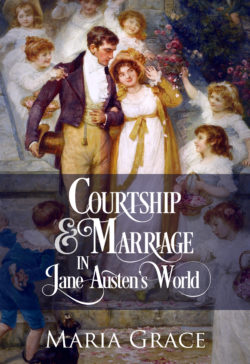Discreet Affections in Jane Austen’s World

When Mr. Darcy proposed to Elizabeth at Hunsford, she was taken utterly by surprise. How likely was it that the discreet affections of a courtship could really escape the notice of one of the parties involved?
Courtship Advice for the Gentleman
Unmarried men had to exercise caution around unmarried young ladies. Attentions or even particular friendliness might be interpreted as romantic interest by the lady or her friends and family. Since men were not to express interest unless serious about a woman, misunderstood actions could lead to accusations of leading a woman on. Pressure to offer marriage might follow. No wonder Mr. Darcy, did not wish to raise the hopes of any young woman in Meryton.
To make matters more complicated, suitors were also advised to take time in courtship–so their discreet interest was supposed to go on for some time.
Those marriages generally abound most with love and constancy, that are preceded by long courtship. The passion should strike root, and gather strength before marriage be grafted on it. A long course of hopes and expectations fixes the idea in our minds, and habituates us to a fondness of the person beloved… (The Young Husband’s Book 1839.)
But, attention of such duration could easily be interpreted as serious interest which would raise a lady’s expectation. Poor guys couldn’t win for trying, could they?
Courtship Advice for the Lady
Female conduct manuals universally cautioned women not to be forward in their dealings with men or to encourage their advances. A woman must never confess her feelings until absolutely convinced of his intentions. Some writers went so far as to insist a woman must never look at a man unless he made the first advance.
The Advantages of being reserved are too many to be set down; we will only say, that it is a Guard to a good Woman, and a Disguise to an ill One. It is of so much Use to both, that those ought to use it as an Artifice who refuse to practice it as a Virtue. (The Whole Duty of a Woman, 1737)

Clearly neither Lydia Bennet nor her mother ever quite got hold of this advice.
Following this advice could lead to problems though. In Emma, Emma must deal with an unexpected declaration from Mr. Elton in the confines of a carriage. He thought his intentions had been made clear, but she is blindsided by them. An awkward, uncomfortable scene for both.
Similarly, poor Elizabeth Bennet was utterly gobsmacked by Mr. Darcy’s declaration: “My feelings will not be repressed. You must allow me to tell you how ardently I admire and love you.” Apparently he had the whole discretition thing down to a science.
Charlotte Lucas of Pride and Prejudice realized the shortcomings of this advice. She boldly counsels Elizabeth, “…but it is sometimes a disadvantage to be so very guarded. If a woman conceals her affection with the same skill from the object of it, she may lose the opportunity of fixing him; … there are very few of us who have heart enough to be really in love without encouragement. In nine cases out of ten, a woman had better shew more affection than she feels.” Austen’s readers were probably shocked at such a proclamation. But I have to wonder how many secretly wished they could do just that.
Find References Here!
To Read more articles on weddings, click here.
To read more articles on courtship click here.
To read more articles on marriage click here.
Want to learn more? Try Courtship and Marriage in Jane Austen’s World, available in ebook and paperback
.
Please support this author and website by using this affiliate link.

Oh yes!
As you allude to it in charlotte1s advice, another example of such a difficult situation was the Jane Bennet/Charles Bingley relationship. Depending on how strong this principle was applied in real life (see the opposite example of Lydia, Mrs. Bennet or even Caroline Bingley, depending on interpretation), Darcy’s interference was even more officious and wrong: He condemned Jane Bennet for behaving with the prefect propriety (not showing her feelings, especially to the outer world, until Bingley declares himself) wjhile also condemning the other Bennets for breakingthis rule of etiquette for young females.
You’ve got a really good point!
Darcy’s “evidence” that Jane wasn’t interested was that she showed the same pleasant façade to everyone. He didn’t condemn Jane for her propriety, but for the same thing Charlotte cautioned against–showing too little interest toward the person she was interested in marrying. Remember, Darcy thought Elizabeth’s actions towards him indicated interest. Yeah, I know, the man was clueless, but he didn’t think Elizabeth’s action improper. He thought Jane equally pleased with everyone.
That’s a really interesting observation, Michelle. I hadn’t thought about it that way. Hmmm…
I am just so glad I live in modern times although they’re not perfect. But we can be much more up front about our feelings and intentions. I am afraid I would rebel against all those rules.
Me too!
Plus, since Darcy had mixed feelings about his attraction to Lizzie AND he was naturally standoffish except around people he knew really well, that added to his inability to show how he felt in a way she’d notice.
Good point, Miriam!